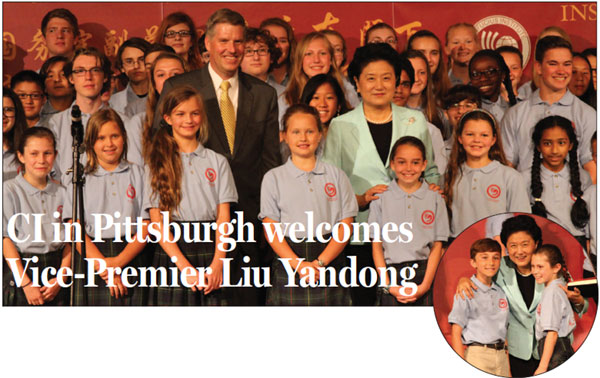CI in Pittsburgh welcomes Vice-Premier Liu Yandong
Vice-Premier Liu Yandong visited the Confucius Institute at the University of Pittsburgh, and stressed the importance of learning a new language to better understand a culture.
"Language plays a particular importance in culture. To master a foreign language is like you utilize a key to get to know your friends, understand the world, and encourage prospects for the future," Liu said in remarks on June 20. Her visit to Pittsburgh was part of a series of events leading up to her participation in the sixth China-US High-Level Consultation on People-to-People Exchange in Washington.
There are over 487 Confucius Institutes and 894 Confucius classrooms in 133 countries globally, with a total of 3.5 million students, Liu said. In the United States, there are 180 Confucius institutes and 400 Confucius classrooms, with about 300,000 students.
|
Patrick Gallagher (left center), chancellor of the University of Pittsburgh, and Vice-Premier Liu Yandong (right center) are joined by students of various language programs conducted by the Confucius Institute of the University of Pittsburgh on June 19. Liu visited the Pittsburgh school campus as part of side activities leading up to the Sixth Round of China-US High-Level Consultation on People-to-People Exchange. Photo by Amy He / China Daily |
Each institute and classroom, she said, deepens the friendship between the two countries and "also demonstrates the level of importance that US universities and the education sector attaches to closer cooperation between China and America."
Started in 2007, the Confucius Institute at the University of Pittsburgh (CI-Pitt) is one of 97 Confucius Institutes at US universities. The institute trains Mandarin-language teachers who then go on to teach students grades K to 12 in school districts across Pennsylvania and Ohio. The program today has 35 student teachers and over 4,000 students in 19 counties across the two states, representing 70 school districts where the CI-Pitt has programs.
"We believe that this is for many kids an exposure they would never have at any other level, and yet we're able to reach kids in rural schools and public schools and private schools, who actually have some understanding and interest in China, and are really taking that step to become global citizens, which is what we really find to be the value," said Michele Ferrier Heryford, director of the institute.
Heryford told China Daily prior to the vice-premier's visit that more and more students have shown interest in both training to teach Chinese as a foreign language and in learning Chinese. The CI-Pitt is one of the first 25 Confucius Institutes established in the world, and was Confucius Institute of the Year in 2008, 2011 and 2013.
The director said that it doesn't take a lot of convincing to get students to learn Chinese, and that CI-Pitt has seen such a high level of interest that it has begun turning students away.
"We don't want to grow this so fast that we start losing the quality of what it is we're trying to do. We do have some leaps in enrollment from one year to the next, and that we really try to stay on top of it. We have so many people who, more districts who want in, that we're trying to figure out how to grow this in a way that's sustainable," she said.
Nicole Constable, director of the Asian Studies Center at the University of Pittsburgh, said that Confucius Institutes are vital because in many schools, there aren't a lot of opportunities to study foreign languages.
"The opportunities have decreased in recent years. But I think students and schools recognize that Chinese is an incredibly important language to have, and I think they recognize that China is a very important part of the world," she said.
Established in 2004 by the Office of Chinese Language Council International (known as Hanban), Confucius Institutes promote Chinese language and culture learning through teaching Chinese as a foreign language.
One of the schools that are working with CI-Pitt is the Valley School in Ligonier, an independent school for students in kindergarten through the ninth grade in Westmoreland County. Students from the school gave a performance for the vice-premier on June 20 after she toured the Confucius Institute at the University of Pittsburgh.
The Valley School is in its fourth year of participating in the language exchange with CI-Pitt, where Chinese instructors from Wuhan University teach the students the language through an immersion-style program. Students use Chinese in every day interactions beyond the time specifically designated for language instruction.
Clair Ward, head of the school, said that students study Chinese from the second to fourth grade to gain cultural and language exposure.
"Our belief is that at a young age, if they're exposed to native-speaking Chinese speakers as well as non-native-speaking English speakers, they're getting culturally enhanced," she said. "The parents just wish we can do more and more and more."
Dai Qing, a 24-year-old student from Wuhan University who is teaching a class of 18 fourth graders at the school, said that she loves the experience. "I love the school and it's really a lot of fun with the kids," she said.
amyhe@chinadailyusa.com



















